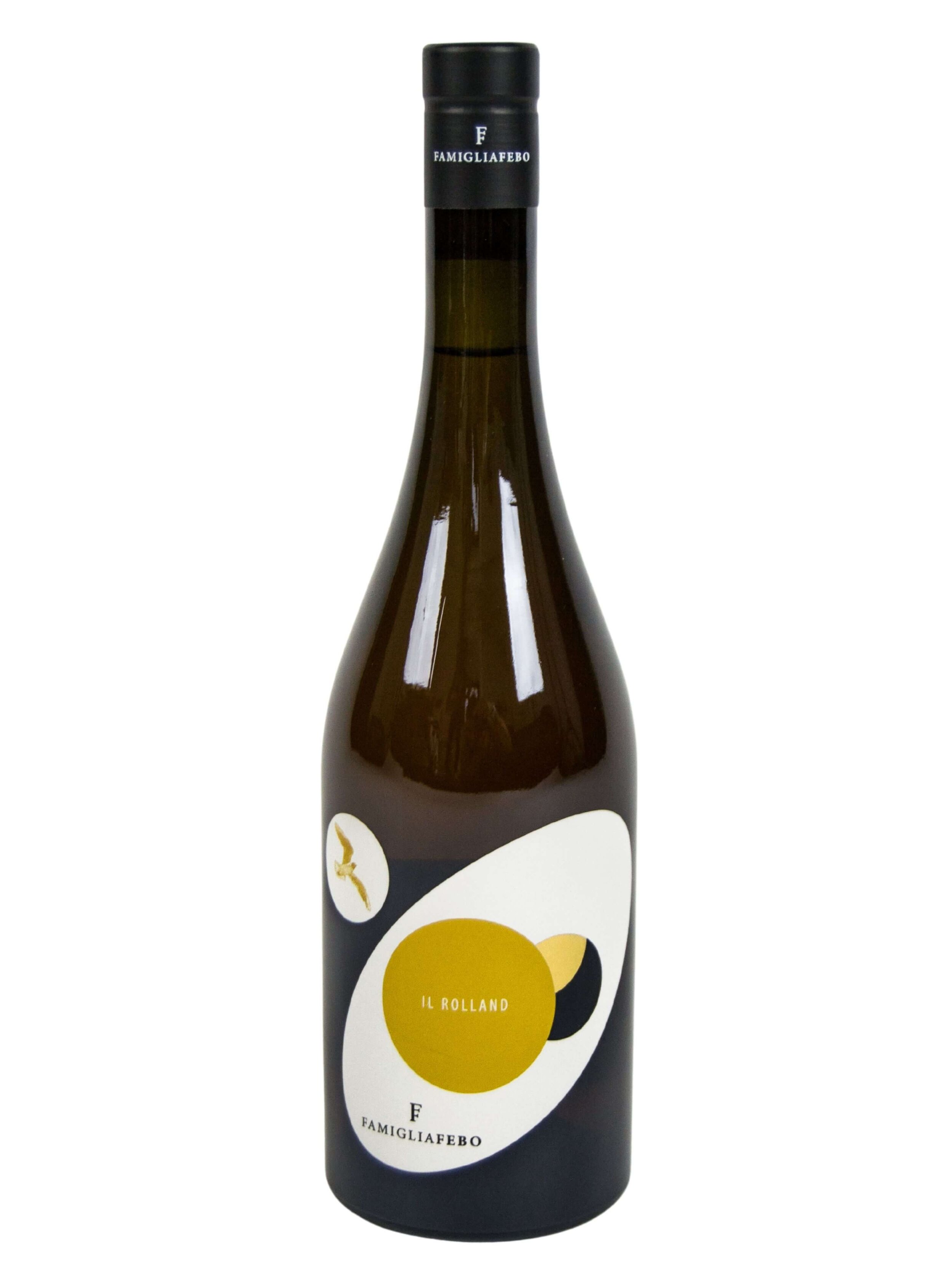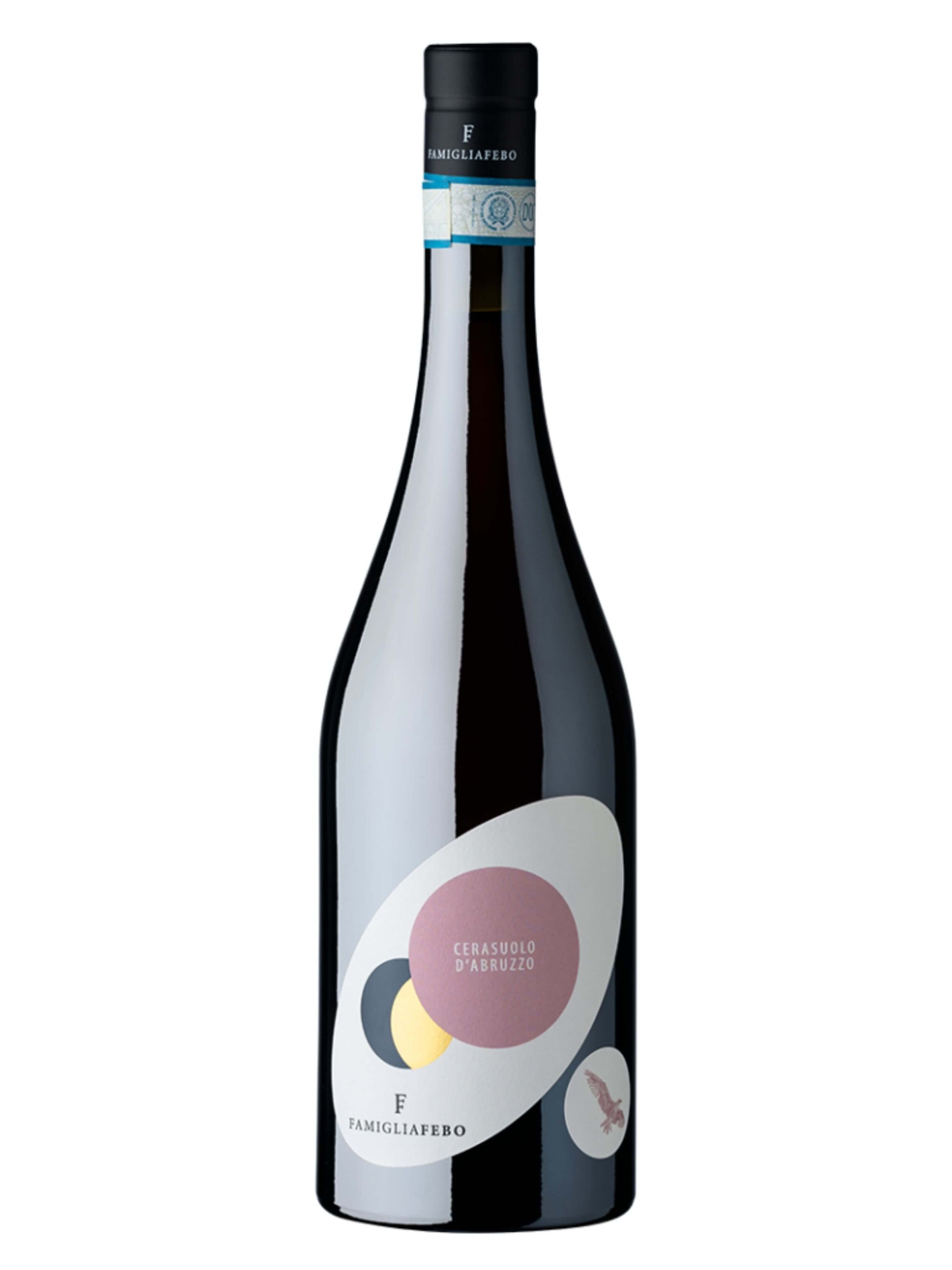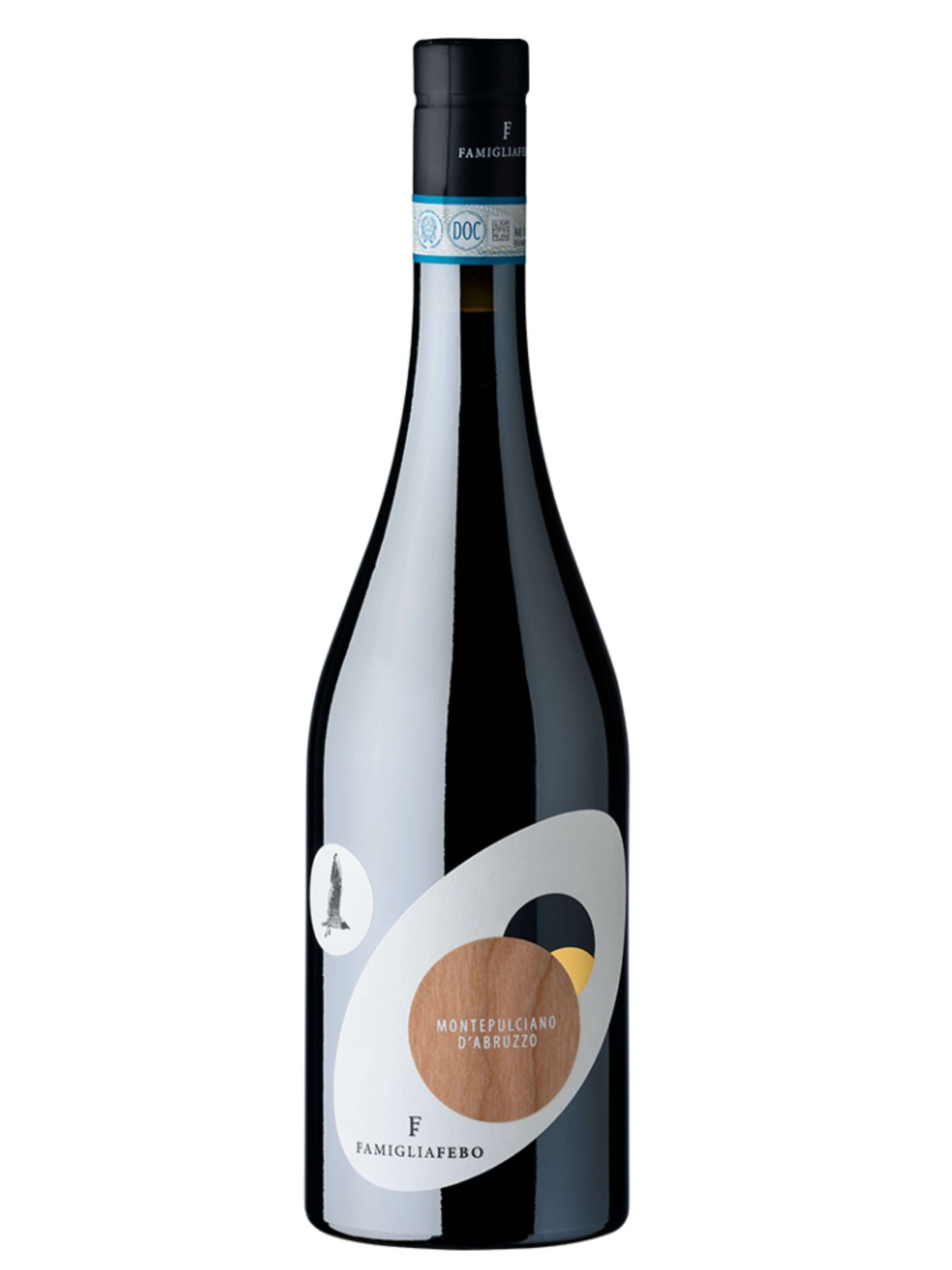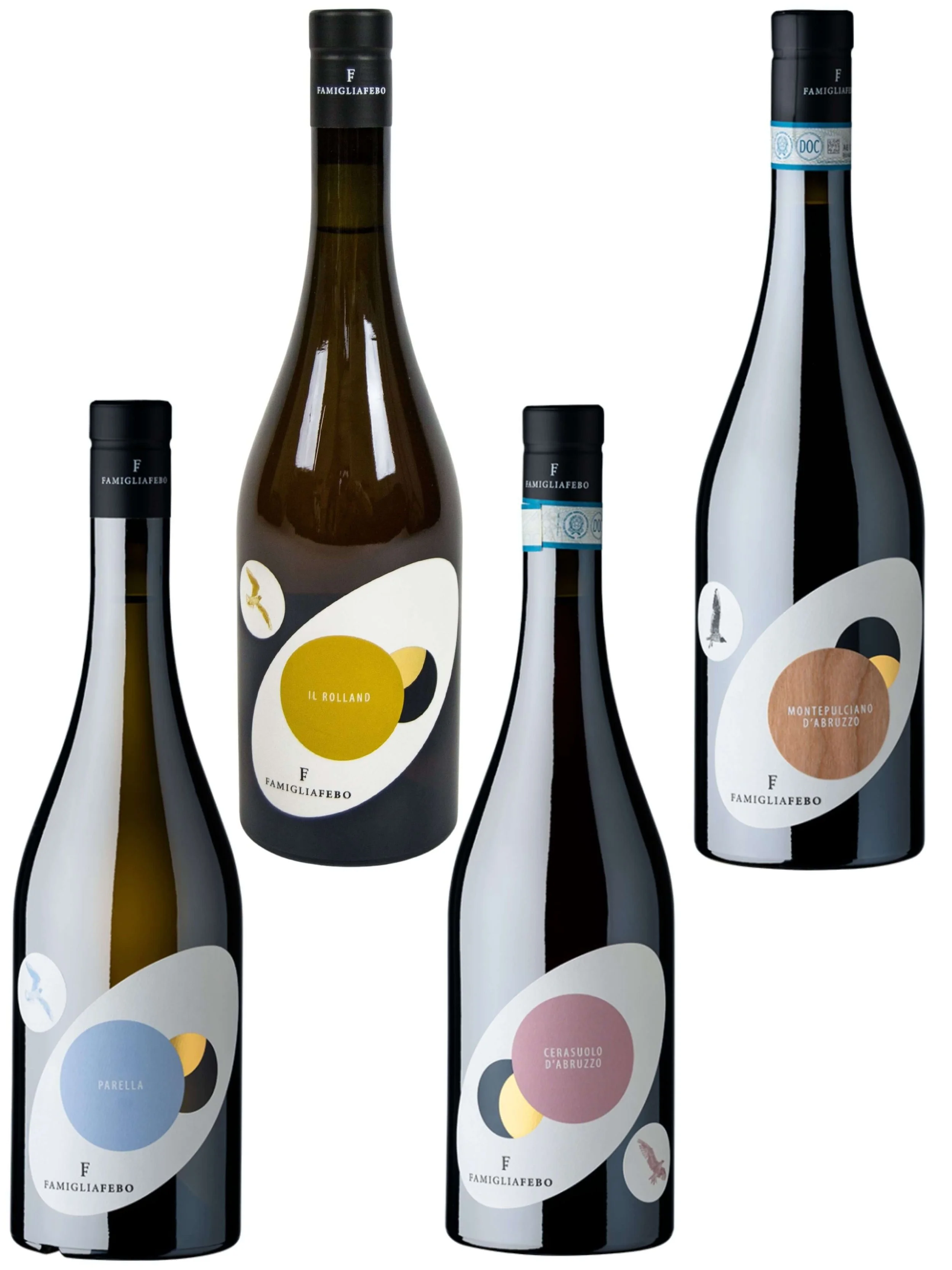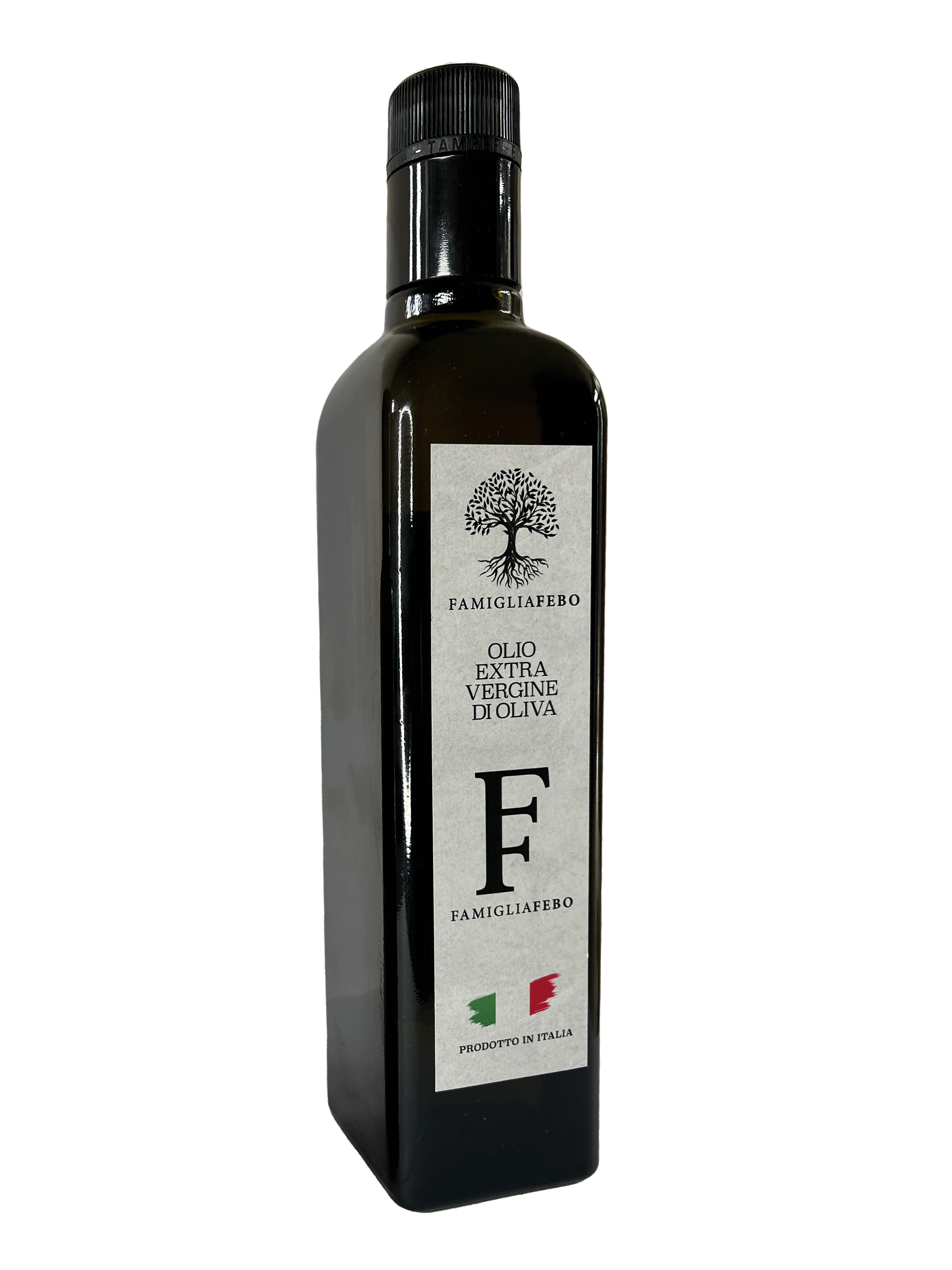Celebrating Family through the Fruits of the Earth
It wasn’t until four years ago, in 2018, that siblings Davide and Laura Febo launched the first commercial bottlings of their Abruzzo wines under the Febo family name. When we heard part of their story in our VeroTalk guided tasting and chat (watch the recording here) with the siblings, we just had to learn more about them. Like several wine stories we’ve heard before, it occurred years after these children of southern Italian farmers left their home in the south to establish professional careers in the north. But the siblings began longing for their childhood bucolic lifestyle, recognizing their hearts and souls were rooted in the earth, in the land they grew up on inherited from centuries of ancestors, in their regional wines, and in the traditional grapes of Abruzzo.
A Montepulciano vineyard of the Febo Family in Abruzzo, Italy
Davide and Laura left their careers and returned to the property their family had been farming since 1560, to carry on the Febo name through production of natural and organic wines of Abruzzo. With an embrace of tradition and an aim toward producing wines that express the terroir with innovation and an eye to the future, Davide and Laura Febo picked up the torch passed down from their grandfather Rolland, the first in the long line of ancestors to turn their grape vines into a winemaking business.
Abruzzo – Green Heart of Italy
Abruzzo, which we introduced in our previous blog article, is a land of soaring mountains, rolling green pastured hills leading to a thin strip of coastline along the Adriatic Sea, dotted with Trabocchi – traditional wooden fishing piers. The entire peninsula of Italy is outlined by seas and girded by mountains and hills that fortress its north and run its spine. But the region of Abruzzo, in central eastern Italy along the Adriatic coast, is particularly dominated by peaks and hills. It is composed 65% of mountains and 34% hills, leaving only 1% that can be called plains.
Abruzzo is considered the “Green Heart” of Italy for its mountainous national parks and rolling green hills. Its rugged interior is dominated by the high elevation Grand Sasso massif, and may be most known for its cool, mountainous capitol city of L’Aquila. But, the winegrowing areas predominate along the region’s eastern two-thirds, nearer to the sea where temperatures are moderated and hills and slopes of the Central Apennines provide a balanced landscape for vines. You can read more about the scenery, history, and land of Abruzzo in our previous article.
Family Heritage
Here, in this band between mountains and sea, near the small village of Spoltore, Davide and Laura Febo meticulously farm organic, biodynamic vineyards on patches of the original land where their ancestors have been growing vines, raising animals, and tending crops for over 450 years.
Grapes, olive trees, and making wine for family, neighbors, and field hands have been part of the family patrimony here since 1560 when Alessandro Febo purchased a small plot of land outside Spoltore, a village 5 km from Pescara in the hills overlooking the sea.
Nonno Rolland Febo, also a vigneron, shown here with his sheep on the family farm in Abruzzo, Italy.
But it wasn’t until generations later, in the 1960s when Rolland Febo, Nonno (grandfather) of Davide and Laura, turned the production of wine into a family business, selling bulk wine from the robust native Montepulciano grape on trips to the north. Nonno Rolland’s small winery was the center of the rural family life that Laura and Davide were born into, played around as children, but never imagining they’d inherit.
We sat down with Davide and Laura Febo to talk about their family heritage, the grapes of Abruzzo, their land and the first wines they bottled with vintage 2018 to introduce to the world to the Febo family name. Their passion and driving mission is to make wines that are “a clear expression of the territory and of our passion for viticulture”
Febo produces four organically farmed wines from three grapes indigenous to Abruzzo: Montepulciano d’Abruzzo DOC, Cerasuolo d’Abruzzo DOC (both made from the Montepulciano grape), and two white wines, one from 100% Trebbiano grapes and one from 100% Pecorino.
The resulting wines are pure expressions of land and grape. Davide, once a lawyer, oversees vine growing and winemaking, while sister Laura, once in publishing, tends to commercial concerns, from marketing and sales to the award-winning design of their labels. The modern stylized labels feature phases of the moon (to express the changes of the season, and the vineyards’ tie to the cosmos) and a gabbiano or seagull (evoking the call of the sea air, just kilometers away and within sight of their main winery and vineyards in Spoltore).
Laura Febo
How Is This Pure Expression Achieved?
To the Febos, the story of territory includes showcasing the native grapes of Abruzzo, responding to the differing growing conditions of their two vineyards, and allowing spontaneous fermentation from the native yeasts that flourish in the concrete fermentation tanks they inherited from their grandparents.
Davide farms “beyond” organically with a hand-crafted approach. In their inherited vineyards in Spoltore and Chieti, most grapes are still trained on the traditional Pergola Abruzzese, allowing for airflow and protection from the sun. They adhere to low to no intervention and don’t use chemicals in the vineyard nor winery, to sustain the natural environment and allow “healthy vines and grapes to express themselves.” Davide emphasizes that they “interpret every single vine with respect to its vine age, aspect to the sun, and vintage. We don’t intervene much at all in the vineyard, not even for leafing, to allow the vine to maintain its own equilibrium, to express itself through its own healthy balance.”
In the winery, the grapes are also handled with artisanal care and minimal intervention. Hand-picked grapes are kept separated by vineyard plot. After gentle pressing (and for whites, separation from skins), the juices rest in the concrete tanks awaiting spontaneous fermentation. No adjustments are added, and not filtering. None of the Febo wines touch a wood vessel that might mask the natural character of the grape and terroir.
Instead, the family is proud to embrace their Nonno Rolland’s concrete fermentation tanks. Both fermentation and aging occur here, spurred by yeasts native to the winery, with the assist of stainless steel. But there’s a story behind those tanks – one Laura enjoys recounting (because her 96-year-old Nonna, her grandmother, still enjoys recounting).
You see, in the 1960’s when Rolland decided to plant just 2000 square meters (about 1/5th acre) of Montepulciano (and by 1964 dedicated himself to vinifying wine), he knew he wanted to grow beyond selling this deep, robust local wine only to local clients. So little by little he added to the vineyard, eventually converting three hectares of pastureland to more grapes he would sell to local cooperatives. But he dreamed big. He only needed expanded winery capacity to produce enough wine to begin selling it in bulk to happy buyers in the north. He worried about how he could possibly finance the purchase of more tanks to make this dream real.
The Febo family’s cement tanks, purchased by Nonna.
Enter Nonna
Meanwhile, unbeknownst to Rolland, for five or six years, his wife had been harvesting fresh fruits and vegetables and taking them to town daily to sell at the local market. She secretly set aside the earnings, building up a hefty savings after all those years. When her husband was finally at the brink of exasperation, as the family story goes, she surprises him, showing him the cash he needed to purchase a row of large concrete fermentation tanks. He was overjoyed with relief, and she, in turn, was excited and proud. The legacy of that day is celebrated with Nonna painting the tanks in a unique (and modern for that day) bold red and white design. Each vintage since has been a proud reminder of her contribution to the family business (one Rolland couldn’t have done without), and to the elegance of the wines they produce.
Two Vineyards. Two Personalities.
The original estate land surrounds the family home and cantina (winery) in Spoltore. Additional vineyard parcels were inherited from Davide and Laura’s maternal side of the family, the “Parella Vineyard” in Chieti. Both vineyards are planted on rolling hills not far from Pescara and benefit from some cooling sea influence. The red Montepulciano is grown in both vineyards while the white grapes are dedicated, one to each vineyard. Together the vineyards give the Febos flexibility for growing grapes native to Abruzzo.
Spoltore Vineyard: The “reticent” one
Davide Febo at harvest in their winery.
Named for the town that lies just above it, Spoltore Vineyard is about 4-5 km from the sea. Vines are planted on north facing slopes of hard, low-fertility calcareous clay. The grapes feel the cool from fewer sunlight hours, so the growing season is longer and slower here. In rainy vintages, like 2018, more Montepulciano may need to come from the sunnier vineyard in Chieti.
In addition to Montepulciano, this is where the white Pecorino is grown. It is a younger vineyard (the oldest vines are 25 years old) and some have been planted to Guyot. Not only are the grapes here slower to ripen, but even the fermentation of the grapes can be much slower. The spontaneous fermentation may start in just two days, but it is long and slow, sometimes taking over 20 days, even a month to ferment. The wines in the bottle are a bit reticent too and need their time to rest and come around. Even when poured in the glass, give them a little air, a few minutes time to open and bloom.
Parella Vineyard: The “outgoing” one
Named for a small home on the property, this vineyard near Chieti is about 20 km from the sea, but still receives some sea breezes. Quite opposite to Spoltore, these vines are planted on south to south-west facing slopes and more fertile sandy soils. The grapes can ripen quickly, and Davide calls it a “nail-biter,” in some vintages, watching the acid and sugar levels that they don’t move too fast. The wines are immediately approachable, gregarious. They are more broad and friendly and come ready to drink.
The Febo Wines
Febo Parella, Vino Bianco — Made with 100% Trebbiano d’Abruzzo grapes
12% ABV - From the Parella Vineyard near Chieti, this white wine leads with the noble Trebbiano Abruzzese grape. Spontaneous fermentation occurs in concrete tanks.
The color is a brilliant pale gold. The nose entices with white blossoms wrapped in aromatic herbs. The palate explodes with acidity and an intense lemon peel accompanied by flavors of thyme and rosemary while that citrus might evolve to lime. Though it is refreshing, this wine isn’t a lightweight. It is focused on a textured palate with a long finish.
Pair with fish dishes, linguini and clams, pesto dishes, chicken or pork and fish crudo or tartars.
Febo “Il Rolland” Vino Bianco — Made with 100% Pecorino Grapes
13.5% ABV - From the Spoltore Vineyard, you guessed it, this one is named after their grandfather, Rolland (this was his home vineyard, the one right outside the winery where he passed daily as he worked). This white wine leads with the popular and recently (1980’s) saved Pecorino grape. Spontaneous fermentation occurs in Nonna’s concrete tanks. This is the cooler vineyard with younger vines, yet the Pecorino grape is known for gaining high sugars (and alcohol) while maintaining acidity.
The color is a deep, rich gold from a warmer 2020 vintage. There is a natural concentration in this wine that you sense on the palate along with some phenolics and flavors of bitter orange, herbs and dried apricot with a saline, savory finish.
Enjoy this rounder more robust white wine with meat dishes like roast lamb or pork loin, aged cheeses drizzled with honey or orange marmalade. Try with creamy pasta dishes, risotto, or cannellini beans. And don’t forget the local Brodetto di Pesce. This wine will stand up to the tomato base of this multi-seafood soup.
Febo Cerasuolo d’Abruzzo DOC — Deep Rosato Made from 100% Montepulciano Grapes
13% ABV - The robust and savory Cerasuolo (cherry-like Rosato wine) is Abruzzo’s pride and calling card in the wine world. The deep color and herbaceous quality of these wines is thanks to its grape – Montepulciano.
Grapes are de-stemmed and allowed a 2-hour maceration then sent to press, where the juice is separated into cement tanks for spontaneous fermentation. That simple de-stemming opens the berries just enough to release the deep dark cherry color you see in the glass, all thanks to the anthocyanin-rich Montepulciano grape.
A beautiful deep pink color with tinges of mauve. Fruity raspberry, Black cherry and violet weave together with dried herbs on the nose. Flavors of strawberry and raspberry are juicy with mouthwatering acidity. An herbaceous almost mineral note touches flavors of raspberry on the finish.
This is seriously your “goes with everything” wine. It is fabulous with pizzas – contrasting nicely with spicy pepperoni (spiced salumi) or a white pizza. Try almost any pasta dish – whether red or white or broth based. Grilled panini, appetizers from salumi to chicken liver, simple roasts, roasted chicken, and a range of vegetable dishes and pots of long-stewed beans.
Febo Montepulciano d’Abruzzo DOC – Red wine from 100% Montepulciano Grapes
13.5% - Davide wants to show how the native Montepulciano grape, sometimes known for big, rough wines, can actually showcase grace when it is made with a light touch. The grapes are hand-picked and de-stemmed, but only allowed to macerate 1 week on the skins, before pressing off. The color is already given up at the stage, but the tannins are held at bay. The juice goes through spontaneous fermentation in Nonno (and Nonna’s) concrete tanks.
The result is an elegant and lithe red wine. A gorgeous deep magenta color, it greets the nose with beautiful blue flowers, sweet plum and damp earth. The palate delights with a bright acidity enveloped in a medium-bodied juicy plum-boysenberry flavors. The core is of red fruits and dry cherry cola on a surprisingly lithe, silky palate with a light coating of tannins.
For those plum and berry flavors on a balanced, elegant, silky palate, pair with roasts and venison, filet mignon and melted gorgonzola cheese, gourmet hamburgers and anything in a balsamic reduction. It goes perfectly with the local specialty of Spiedini (Abruzzese lamb skewers). I would love to try this with mushu pork, carne asada and even chicken mole with black beans.
Heritage Continues
Davde and Laura Febo walking through a family vineyard.
Laura and Davide tell me they sometimes pinch themselves to realize what they have decided, what they have achieved. They hadn’t imagined they’d follow in the footsteps of their ancestors as farmers and winemakers on this family land. They knew they were getting away to forge bright careers. But the call home to the rolling green heart of Italy was strong.
They are proud to make authentic wines that give voice to their Abruzzo heritage and hope they are creating an evocative image of the place through their wines. They hope to continue expressing the lives of the people, the personality of the land, and the emotions of rural Abruzzo life through every bottle of their Febo wine.
Laura and Davide get huge smiles when they say they their Nonno would have never imagined this, their return to take the reins of his winery, gaining international recognition with their wines in bottle, not just in the north, but in America too. We can’t wait to see what is next for the Febo wines. Nonno Roland would be proud.
This article is written by Mary Beth Vierra, founder of Crush Course. She’s a Certified Wine Educator and Italian Wine Scholar.








